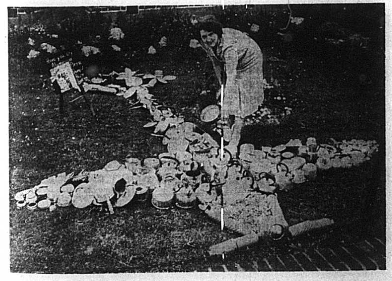In 1914-18 and in 1941 we were saving our country, in more ways then one. Today we are urged to recycle rubbish to save the planet, but even back then we were urged to do the same. Everything was saved – paper, tins, glass jars and even bones, to larger objects such as iron railing.
This article, taken from the Bromley & District Times in February 1941, raises some interesting points, including encouraging Britain to salvage these materials and to use the ‘raw’ materials in this country to produce goods, rather than shipping (sometimes unessential articles) from overseas.
In today’s current climate, perhaps we need to revisit this idea. They did it then – can we do it today?
Salve All Waste
It should not be necessary, and perhaps it is not necessary, to emphasise how tremendously important it is that what are known as waste materials should be saved up and placed on one side for the refuse collector when he makes his weekly call.
But, at the risk of being a little wearisome, we will again impress on everyone the need for saving up every bit of material that can be saved, Principally this applies to paper of all sorts and metals of every kind, though bones and glass jars also come into the category of articles that should be saved for the dustman.
Councillor Lyle, Chairman of the Establishments Committee of Bromley Town Council, again drew special attention to this need at last week’s meeting, and gave an outline of what had already been done in a way of salvaging. Your half-a-dozen newspapers a week and an occasional tin may not see, to matter very much, but the old Scot’s proverb has it that “Many a mickle makes a muckle,” and it was the accumulation of half-a-dozen papers her and half-a-dozen there that resulted in 450 tones of paper being saved in Bromley during the year. And it is just the same with tins and scrap metal.
Over another 400 tons of this was saved during the year. It was sold at a profit. But that is not the point. The point is that it was saved; it went into production again, and for every ton of new material it was able to product it represented a ton of shipping space saved.
After all these months of war no one can plead ignorance of the toll that has been ta ken of our shipping by the enemy, nor of the need there is that not a ton of space should be used for the conveyance of unessential articles, or even of essential articles, that might be produced at home if the raw materials are to hand. Salvage represents the raw material, and it is a crime to deprive the nation of its use.
ken of our shipping by the enemy, nor of the need there is that not a ton of space should be used for the conveyance of unessential articles, or even of essential articles, that might be produced at home if the raw materials are to hand. Salvage represents the raw material, and it is a crime to deprive the nation of its use.
Source:
Bromley District Times, 14th February 1941, page 4





